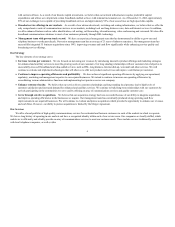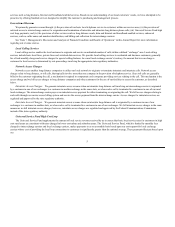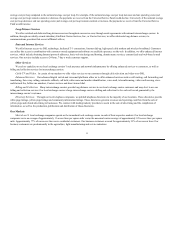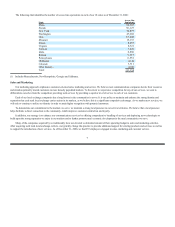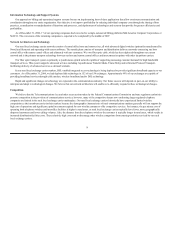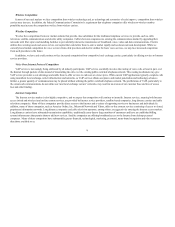FairPoint Communications 2006 Annual Report Download - page 16
Download and view the complete annual report
Please find page 16 of the 2006 FairPoint Communications annual report below. You can navigate through the pages in the report by either clicking on the pages listed below, or by using the keyword search tool below to find specific information within the annual report.
subcontractors or electric utilities with which we have contracts already possess the requisite authorizations to construct or expand our networks.
Promotion of Local Service Competition and Traditional Telephone Companies
As discussed above, the Telecommunications Act provides, in general, for the removal of barriers to entry into the communications industry in order to
promote competition for the provision of local service. Congress, however, has recognized that states should not be prohibited from taking actions necessary to
preserve and advance universal service, and has further recognized that special consideration should be given to the appropriate conditions for competitive
entry in areas served by rural telephone companies, such as our 31 local exchange carrier subsidiaries.
Pursuant to the Telecommunications Act, all local exchange carriers, including both incumbents and new competitive carriers, are required to: (i) allow
others to resell their services at retail rates; (ii) ensure that customers can keep their telephone numbers when changing carriers; (iii) ensure that competitors’
customers can use the same number of digits when dialing and receive nondiscriminatory access to telephone numbers, operator service, directory assistance
and directory listing; (iv) ensure access to telephone poles, ducts, conduits and rights of way; and (v) compensate competitors for the competitors’ costs of
completing calls to competitors’ customers. Competitors are required to compensate the incumbent telephone company for the cost of providing these
interconnection services. Under the Telecommunications Act, our rural local exchange carriers may request from state regulatory commissions, suspension or
modification of any or all of the requirements described above. A state regulatory commission may grant such a request if it determines that such exemption,
suspension or modification is consistent with the public interest and necessary to avoid a significant adverse economic impact on communications users and
generally avoid imposing a requirement that is technically unfeasible or unduly economically burdensome. If a state regulatory commission denies some or all
of any such request made by one of our rural local exchange carriers, or does not allow us adequate compensation for the costs of providing interconnection,
our costs could increase and our revenues could decline. In addition, with such a denial, competitors could enjoy benefits that would make their services more
attractive than if they did not receive such interconnection rights. With the exception of our requests to modify the May 24, 2004 implementation date for local
number portability in certain states, we have not encountered a need to file any such requests for suspension or modification of the interconnection
requirements.
The Telecommunications Act, with certain exceptions, imposes the following additional duties on incumbent telephone companies by requiring them to:
(i) interconnect their facilities and equipment with any requesting communications carrier at any technically feasible point; (ii) unbundle and provide
nondiscriminatory access to network elements such as local loops, switches and transport facilities, at nondiscriminatory rates and on nondiscriminatory
terms and conditions; (iii) offer their retail services for resale at wholesale rates; (iv) provide reasonable notice of changes in the information necessary for
transmission and routing of services over the incumbent telephone company’s facilities or in the information necessary for interoperability; and (v) provide, at
rates, terms and conditions that are just, reasonable and nondiscriminatory, for the physical co-location of equipment necessary for interconnection or access
to unbundled network elements at the premises of the incumbent telephone company. Competitors are required to compensate the incumbent local exchange
carrier for the cost of providing these interconnection services. However, pursuant to the Telecommunications Act, rural telephone companies, including our
rural local exchange carriers, are automatically exempt from these additional incumbent telephone company requirements. The exemption remains effective
until an incumbent rural local telephone company receives a bona fide request for these additional interconnection services and the applicable state authority
determines that the request is not unduly economically burdensome, is technically feasible, and is consistent with the universal service objectives set forth in
the Telecommunications Act. This exemption remains effective for all of our incumbent local telephone
14


